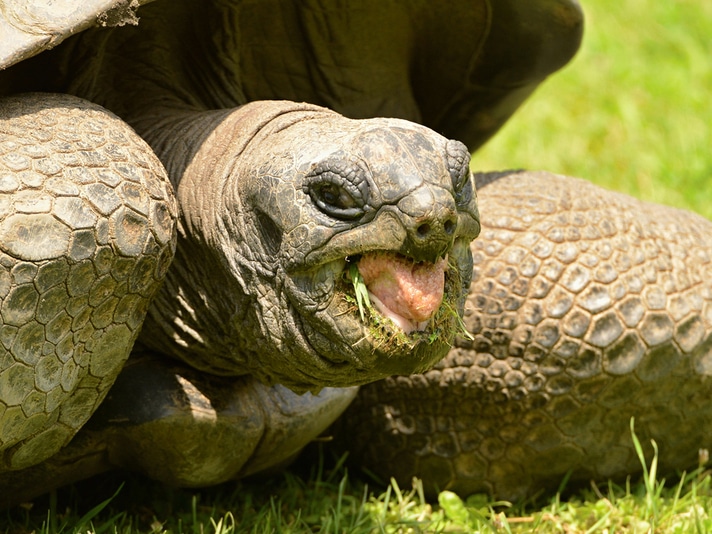Care sheet for the Aldabra tortoise (Geochelone gigantea).
Aldabra Tortoise (Geochelone gigantea)
Aldabra tortoises are found on the islands of the Aldabra Atoll in the Seychelles, and they are one of the largest tortoises in the world (the largest tortoise on record being the Galapagos tortoise – Geochelone nigra). Aldabra tortoises have a varied habitat on their home and introduced islands, ranging from mangrove swamps and coastal dune areas to grasslands and scrub forests.
Aldabra Tortoise Availability
You can find Aldabra tortoises for sale at select reptile stores, reptile shows and sometimes on the Internet. If you are able to find one, no doubt you will find them very rewarding to keep.
Aldabra Tortoise Size
The average weight of an adult male Aldabra tortoise is approximately 550 pounds, although there is one at the Fort Worth Zoo that weighs in at nearly 800 pounds.
Aldabra Tortoise Life Span
Aldabra tortoises are long lived, some having reached more than 200 years of age. The oldest known Aldabra in captivity at the time of this writing is 170 years old.
Aldabra Tortoise Diet
Aldabra tortoises are mostly herbivores. In the wild, they eat grass, leaves, plants, stems and other tasty weeds. They will also feed on insects and dead animals, even their own kind. In captivity they will eat grass, flowers, cactus pads, all sorts of leafy greens and commercial tortoise food. They also like fruit and melons.
Aldabra Tortoise Behavior and Life History
Aldabra tortoises spend the mornings and early evenings eating, and they spend the hotter parts of the day in the shade or lounging in shallow water holes. They are deceptively quick when they want to be and will actually sprint away if frightened. If they think you have a treat for them they will sprint right to you.
Aldabra Tortoise Housing
Keeping Aldabra tortoises outdoors is usually the best way to house them. Hatchlings up to 2 years old can be housed indoors, but once they get beyond that, they need the great outdoors to roam. For babies up to a year old, tortoise tubs or the equivalent work very well. Use bark or crushed coconut for the bottom of the enclosure. Provide a hotspot of about 90 degrees Fahrenheit at one end of the enclosure with an ambient temperature of about 80 degrees. Mercury vapor lights work well for this, as they provide both UVB and heat all in one fixture.
Aldabra tortoises get large, so as a rule of thumb, the bigger the outdoor enclosure, the better. I house mine in a pen made of ornate cinder blocks. The wall is a bit over two feet tall, and the paddock area is 100 feet by 30 feet. Depending on how many you plan to house, the size of your paddock can vary. Aldabra tortoises do best at temperatures of 80 to 95 degrees. Provide your tortoise house with heat lamps, heat emitters and/or large outdoor-use heat pads (“pig blankets”) to maintain the proper temperature even when the weather outside is cold. The entrance to the house should be large enough for the tortoise to easily enter and exit, and a door is handy to lock the tortoise inside on very cold days or nights. Aldabra tortoises love mudholes, and if you can build one, or a shallow pond for them to soak in, they will be very content. Unlike most tortoises, they are also good swimmers.
Aldabra Tortoise Breeding
Between February and May, females lay anywhere from nine and 25 eggs in a shallow nest. Usually less than half of the eggs are fertile. Females can produce multiple clutches of eggs in a year. After incubating, the tiny tortoises hatch between October and December.
Artificial incubation works best. However, if you incubate the eggs at between 81 to 86 degrees, they will usually hatch in less time, about 90 to 108 days.
Aldabra Tortoise Considerations
Aldabra tortoises get very large and live a very long time. They need lots of space, special habitat setups and a bit of care. They make very rewarding pets as long as you have the time and space to dedicate to their needs. You'll more than likely have to arrange for their long-term care in advance since they are probably going to outlive you. They are smart, personable and very entertaining. I find that after a long day at work, just sitting outside and watching them eat can calm the nerves of a hectic day.
Ken Foose is the source for Aldabra Tortoise information. Please visit his site at www.ExoticPetsLV.com.


